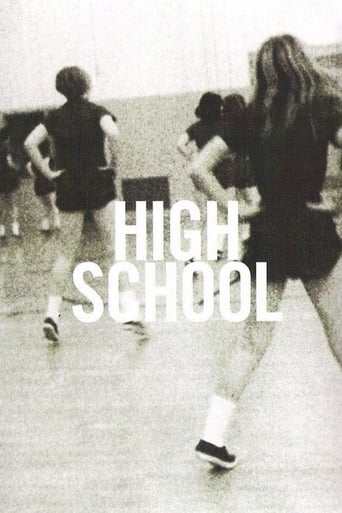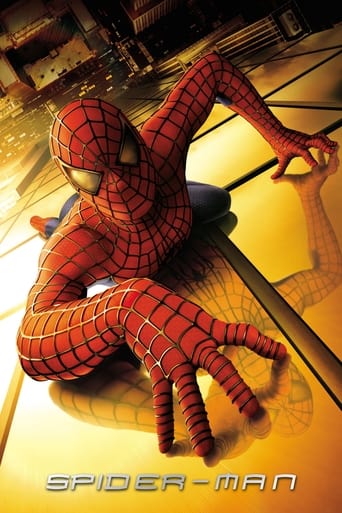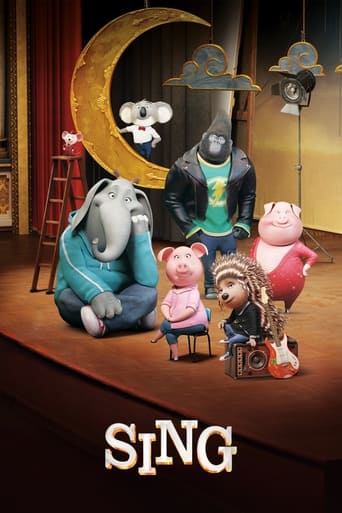


High School
Documentary filmmaker Frederick Wiseman takes us inside Northeast High School as a fly on the wall to observe the teachers and how they interact with the students.
-
- Cast:


Reviews
Plenty to Like, Plenty to Dislike
i must have seen a different film!!
Expected more
At first rather annoying in its heavy emphasis on reenactments, this movie ultimately proves fascinating, simply because the complicated, highly dramatic tale it tells still almost defies belief.
As in TITICUT FOLLIES, Wiseman takes his camera inside an institution and exposes the authoritarianism that dominates the place. However, I have to say I was less disturbed by what I saw here. There are some clear instances of backwards attitudes: the notably different tones of the female and male sex ed lectures, what is apparently a fashion class where the teacher casually remarks of the students' physical shortcomings, and the chillingly obtuse reading of a letter from a student serving in Vietnam. But other clips that seemed designed to point out some sort of injustice or dehumanization didn't strike me as terribly egregious. Are we supposed to judge the English teacher as ridiculous for attempting to teach poetry with a Simon & Garfunkel song? When a kid says he doesn't deserve detention, are you just supposed to say "Oh, sorry about that" and let them skip it? Maybe some of the figures are a little out of touch and some are a little bit drunk on power, but I really didn't see a whole lot to make me think the school was a fascist nightmare or anything. Still, perhaps the attitudes speak louder than the actual actions, and there is a sense of isolation from the real world. And regardless of whatever messages Wiseman is trying to get across, it's a compelling look at a specific time and place.
In his documentary "High School", Frederick Wiseman effectively uses the "cinema verite" approach to capture the oppressive environment in which the students of Northeast High School have to face everyday. Wiseman used a number of creative decisions in composition and editing to give "High School" its rhetorical voice. Perhaps most noticeable is the film's black-and-white format. Though likely to have driven by cost, it powerfully conveys a sense of banality of the atmosphere of the high school. Audience are aware of this being a conscious choice on the part of the director to not include color, but could this very decision also be a metaphor used to represent the actions taken by the authorities of the school and their consequences a dull, sterile environment in which students are sapped of their own individualistic colors. Also prevalent in the film is the use of juxtaposition to create situational ironies in order to further criticize, in a rhetorical matter, the institutional restraints of high school. Towards the beginning of the film, a scene is shown in which the professor is reading tasks off the bulletin of the day to a class. The next scene shows a foreign language class in which the teacher is lecturing on existentialism and various existentialist philosophers. The two scenes seem similar; in that both are in classroom settings and show a teacher lecturing and students listening, but the subjects in discussion contrast each other in their differences. The latter scene can even be interpreted as ironic itself, in that the subject lectured about, existentialism, suggests and requires abstract and free-form thinking, while it shows students reciting the material in an orderly manner. In the absence of a spoken narrative, the voice of "High School" relies much its effect on the indexical abilities of the documentary form and constructing messages out of the indexed recordings. One situation shows a student presenting a seemingly unfair scenario to a staff and expressing his disapproval of a teacher because that teacher had yelled at him and then unjustly given him detention. The staff is shown as uninterested in finding out more of the situation, and instead takes the side of the said teacher and starts to lecture the student about respecting the authority. The documentary form, especially the "cinema verite" model, has the ability to give the illusion of representing unbiased reality Wiseman's use of the indexing quality by showing various scenes in their entirety therefore strengthens the film's voice, as the audience is made to believe they are seeing the whole truth in a few scenes, and encouraged to extend that belief to the entire film. Though that is not to say the "High School" assumes a low audience activity. In fact, the role of the audience is pertinent to the effectiveness of this film. For example, Wiseman appeals to the emotions of the audience to achieve a stronger rhetorical effect. In the closing scene, a teacher tears up while reading a letter from a former student who is now a soldier serving in Vietnam. In the letter the former student does not only confess of his gratefulness for having attended that school because it made him a better person, but also reveal his devotion to the cause of the war and wants his insurance money to go to school if he is killed in Vietnam. The close-ups of the teacher's face reveal a wealth of emotions, expressing joy, perhaps out of self-gratitude for having helped in someway to shape the former student. The audience may perceive the letter as absurd and see it as a real-life consequence of the institutional constraints of the high school that reinforced blind obeying of authorities. Moreover, the tears of joy on the teacher's face may potentially reveal something even more horrifying the teacher is actually proud of her work and stands by the function of the school as an institution and the staff as authority figures.
Well, I attended Northeast while Wiseman and crew were filming the movie. Twenty years later, I finally located a copy in the Indiana University libraries and watched it.I can tell you that he did NOT capture the essence of our high school, due mostly to the disruption caused by the camera crew. I received a better education than anyone else I met in college. Since I double-majored in Electrical Engineering and Humanities at Notre Dame, I was grateful for the college-prep curriculum I had received at NE. My high school Chemistry, Physics, Calculus, History, English and Latin classes left me well-prepared for college.Like the Heisenberg Uncertainty Principle in Physics, where observing a subatomic particle changes its nature, the presence of the camera crew changes what happens in each venue. For example, there's a scene where an English teacher (Mrs. London) plays records all period because the camera's presence prevented students from paying attention to the scheduled lesson. Wiseman made it seem like "Here's what kids are learning all day long."Coincidentally, I lived in Panama for three years. Wiseman's 1977 movie "Canal Zone", about the Panama Canal, presented a similarly incorrect view. Cinema Verite - - at least Frederick Wiseman's version - - is not worth the publicity it receives.
I love this film. It really makes you think about how high schoolers are oppressed. I love the style of this film because it has no narrative, just shots from a high school. There is no one telling you what to think or what is going on. Therefore you are forced to think for yourself about what is going on. It is very interesting to hear the reactions of teachers and students after viewing this film, as they have different interpretations.There are a few scenes that really stand out to me. The main one being the last scene. The woman who reads the letter from the ex-student who is now in Vietnam stressed how "successful" this school has been in creating such a great student. The former student had written her a letter thatn basically stated that he no longer thinks of himself as a person, but as a body. He is humbled by his country and he will blindly obey his orders in the service. He wants his insurance money to go to the school if he gets killed in combat. It is the least he do for a school that taught him such strict discipline - so much discipline that he no longer thinks of himself as a human being with feelings!! That is what I got out of it, at least. It's a great punchline.I would also like to comment on the closeups of the girls butts in the gym. I did not interpret this as some sexist filmmakers getting their kicks by watching the girls jump around in short shorts. I thought it was more of an ironic connection between the girl that was reprimanded at the prom for having such a short skirt. It was also a connection between the fashion show and the teacher who was trying to teach girls how to be ladylike in a very blunt and insulting manner. The school is forcing the girls to wear these ridiculous gym outfits that have very short shorts. Then they force the girls to play ridiculous games and do stupid excersizes. I think it shows how sexist the high school was, rather than the filmmakers. It made the girls all look like objects, which is exactly what the high school was practicing.I thought it was really great how Wiseman included the entire reading of Casey at The Bat. The viewer most likely does not want to hear the teacher read this whole thing, yet we are forced to hear the whole poem read, quite dully. This shows how DULL and dehumanizing high school can be. The viewers are feeling exactly the same feelings the students must have been feeling at the time. We don't want to hear the poem, neither do the students. Yet this is the beauty and absurdity of these high school rituals. I also liked the Spanish class in which the students are repeating the Spanish word for existentialism, and other philosophies. It is very ironic that the students are in this oppressive institution and brainlessly being forced to repeat these philosophies that preach the exact opposite.The girl who gets defenisve about being too individualistic is also ironic. She swears her short skirt was not trying to make her "an individual", as if that was a bad thing. It is so interesting to see how different the generational views are. One student is claiming he is "being a man" by standing up for what he believes in when being wrongly accused of acting up in class, while the vice principal says in order for him to "be a man" he must follow orders and swallow his pride. Such different views about manliness!I could go on and on, but I will not. This is a great film. High schoolers today should watch this film, as well as "No Reason to Stay", another anti-high school film from the 60's. It will re-enforce their gut feelings that high school really does suck.










